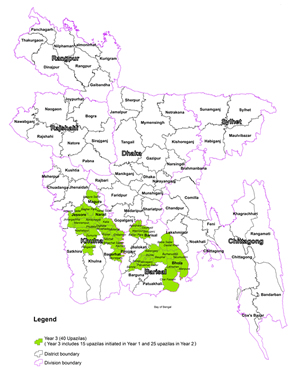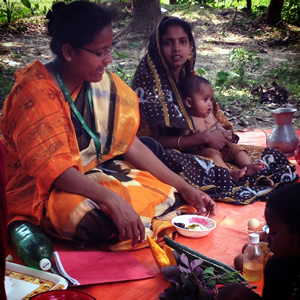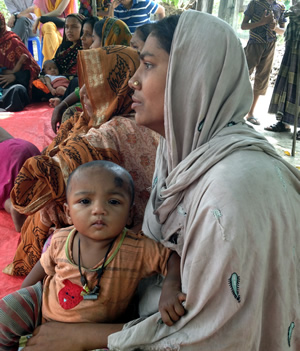A Case Study from Bangladesh

Background
Since 2011, SPRING's work in Bangladesh has aligned with the Government of Bangladesh's (GOB) National Nutrition Strategy across different sectors—including health, hygiene, and agriculture—to implement nutrition-specific interventions through the Essential Nutrition Actions (ENA) framework1 and to promote nutrition-sensitive interventions through essential hygiene actions (EHA), and by concentrating on homestead food production (HFP). SPRING uses the 1,000-day approach to improve the nutritional status of pregnant and lactating women and children under the age of two, and is currently working in 40 upazilas in Barisal and Khulna, two USAID Feed the Future intervention divisions that cover approximately 5.4 million people.
Nutrition Context
Over the past few years, Bangladesh has made important progress in improving the health of women and children.2 However, the 2011 Bangladesh Demographic and Health Survey3 and the 2012 National Micronutrients Status Survey4 confirmed the rampant poor nutrition profile in the country. Women and children 0–23 months have high malnutrition rates: under- and over-nutrition for women, and stunting and wasting for children. Micronutrient deficiencies (vitamin A, iron, zinc, folate, and vitamin B12) and anemia are high among women and children as well. Consumption of calories, proteins, and micronutrients is below the recommended dietary allowance.
Building on Existing Foundations


SPRING builds on international experiences in several sectors to design Bangladesh-specific interventions and innovations by targeting health and agricultural workers within the GOB and among nongovernmental organizations to reach communities and individuals (especially pregnant women and new mothers) with carefully targeted information on breastfeeding, complementary feeding, and other ENAs. The EHA framework and the basics of HFP were included in the ENA training and support materials. These materials were then adapted and tested in the local context.
Government staff from the upazila-level to community-level health clinics were trained, and supportive supervision and monitoring systems were put into place. Delivery of key nutrition services and messages were enhanced at all existing contact points in the health system, including the community outreach network, where services already provide immunization and family planning.
SPRING has also established community-based farmer nutrition schools (FNS) to improve skills and provide support in HFP5 (vegetable gardening, poultry rearing, and fish production) targeting pregnant women and mothers of children under the age of two from the lowest wealth quintiles. The FNS model6 is a season-long training activity that takes place in the field and consists of a group of people with a common interest: they seek to enhance the production capacity of their households by making well-informed crop management decisions. By incorporating ENA and EHA through small doable actions, FNS participants learn how to link their HFP with improved nutrition and hygiene practices.
To encourage handwashing and hygienic behaviors, SPRING promotes handwashing stations, introducing "tippy taps" with water and soap. One tippy tap is set up next to the toilet and another next to the kitchen; this results in a reduction in incidence of diarrheal diseases, especially in young children.7
Results to Date
Using the FNS to support HFP, combined with an intersectoral promotion of ENA and EHA, SPRING has introduced an innovative intervention where women can learn in a participatory way. They gain important HFP skills and acquire nutrition and hygiene knowledge to influence positive behavior change, resulting in improved nutrition outcomes such as increased dietary diversity, improved infant and young child feeding practices, improved handwashing practices, and compliance with micronutrient supplementations.
As of March 2014, 5,064 health workers have been trained, 1,344,482 contacts have been made with women on nutrition and hygiene information from providers, 155,128 household handwashing stations have been established, and 77,564 pregnant and lactating women and mothers of children under two have participated in 3,861 Farmer Nutrition Schools.